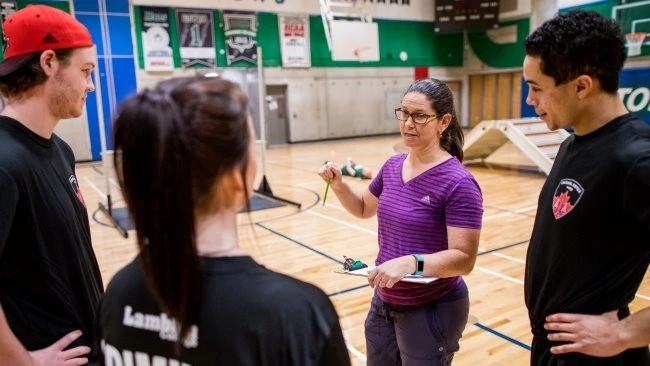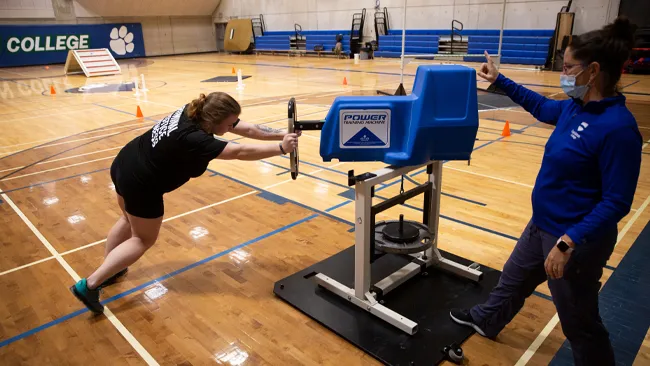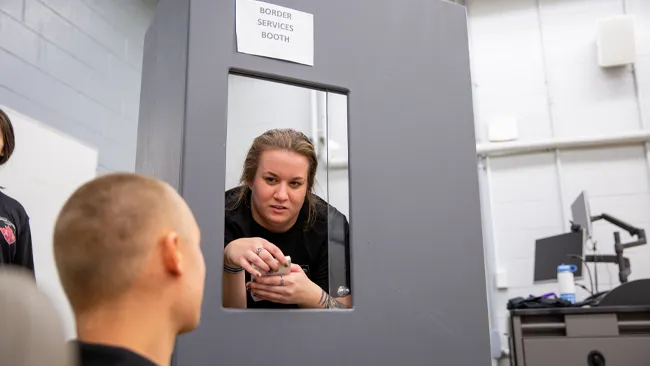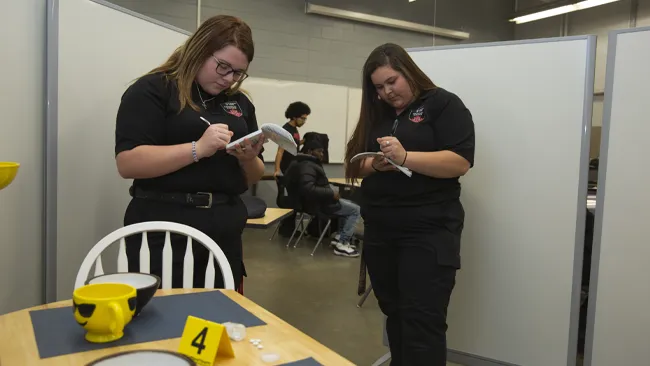Overview
Do you have a passion to serve, protect, and lead? Our police foundations program gives students the confidence to explore different paths in law enforcement, security, and emergency management in the public and private sectors.
During the first year, a broad theoretical foundation is provided on human relations, diversity, mental health, critical interpersonal, communication, and team building skills, and an overview of the criminal justice system.
The second year focuses on courses specific to law enforcement, investigation, police powers, and community policing. Students achieve certification in Non-Violent Crisis Intervention training from the Crisis Prevention Institute and Introduction to Incident Management System (IMS-100) from Emergency Management Ontario.
Enrolling in the Police Foundations program will give you two incredible years of experience, knowledge, and skill that will prepare you for careers in policing, security, corrections, and civilian work within the criminal justice sector. This program provides you with a solid foundation of practical skills development and makes you competitive in the field for a range of careers in public safety, policing, corrections, security, and enforcement services in public and private organizations.
Jala's Story - Why she chose Police Foundations
Admission Requirements
O.S.S.D. or equivalent with:
- Grade 12 English C or U
Mature Student Assessment for this program is available in the subject of English for the purpose of demonstrating proficiency in this required admission subject. For all other admission requirements, applicants must complete the required course(s) as listed above. For more information, please contact counselling@lambtoncollege.ca. Review the Mature Student Admission process.
Academic admission requirements can be obtained through Academic Upgrading and the Pre-Programs at Lambton College.
Community Crime Unit
Students who are selected to work in this new unit will receive first-hand training when it comes to supporting victims of crimes and safe guarding the community, while also gaining an understanding of the factors that can contribute to the crimes being committed.
Costs
- Year 1 $4,124.34
- Year 2 $4,038.42
Please Note: These fees apply to the 2024-2025 academic year and are subject to change. Fees do not include books (unless specifically noted), supplies or living costs.
Additional Fees
-
Uniform$160.00
-
Police Prep Application$100.00
Built-in Experiences
Scholarships Available
There are 10 scholarships available for this program, with a total value of $1,800!
Technology Requirements
In order to keep pace with the requirements of each and every course in your program, Lambton College requires that each student have access to a laptop while studying at our college.
Labs & Equipment
Courses
The Canadian Criminal Justice System
In this course, students acquire foundational knowledge and skills related to the development, structure and practical operation of the Canadian criminal justice system. The course is geared towards students who will become practitioners in the criminal justice field and will require knowledge of their role in relation to the justice process as a whole. Throughout the course, students will have an opportunity to critically analyze the various components of the justice system, as well as examine the overall effectiveness and efficiency of the system.
Community & Social Services
This course is designed to accomplish two goals. The student acquires a working knowledge of community organizations and social services that operate adjacent to the Criminal Justice System. Students also prepare to pursue and complete a required community service practicum. The student is introduced to the important role the volunteer plays in society. Emphasis is placed on the growing relationship between contemporary Criminal Justice Practice and diverse social services and agencies. Both theory and practice is emphasized as the student prepares to involve themselves in appropriate practical volunteer situations.
Canadian Diversity & Strategies in Community Safety
In this course, students critically identify and examine issues in diversity. Specifically, students focus on topics pertaining to inequality in various social settings, including but not limited to: race, gender, ethnicity, class and sexual orientation. Information concerning history, culture, heritage and contemporary issues relating to Canadian Indigenous groups is discussed. Incorporating social/legal explanations of diversity, students develop a clear understanding of the impacted groups and possible strategies of community empowerment.
Critical Thinking & Writing
In this writing course, students respond to current issues and news articles via various styles of paragraphs and essays. Students practice thinking critically and organize and hone their writing to ensure clarity and correctness in their messages. Students explore different perspectives, and through synthesis, analysis, and response, strive for clarity of message and diplomatic expression of opinion based on fact. One of the pillars of Lambton College is a commitment to sustainability and equity, diversity, and inclusion, including Indigenization of the curriculum; where appropriate, readings in this course will reflect this commitment. Critical Thinking and Writing lays the foundation for a subsequent research-writing course.
Fitness & Lifestyle Mangement
This course introduces the student to concepts of wellness and provides practical strategies for developing a healthy lifestyle and physical fitness. Emphasis is placed on the student's understanding of the scope of what it means to be well, healthy and physically fit and how this relates to having a successful career in law enforcement.
Psychology 1
This course focuses on how we behave. It is an attempt to understand ourselves and others. The primary goal of this course is to see psychology as an objective way of studying human experience.
Sociology 1
Focusing on the Canadian perspective SOC 1003 explores the intersectional influences on behavior within the context of human group life. The sociological perspective, data collection, socialization, crime, and the dynamics of group structure and stratification are critically assessed against the backdrop of global interdependence and socio-cultural change. Small group discussion and gamification of materials all offer an enhanced course experience for individual growth and understanding of sociology.
Criminology
Criminology seeks to understand the underpinnings of criminal and deviant behaviour. Students examine this behaviour through sociological, biological and psychological perspectives. Students apply this knowledge in critical examination of Canadian and global crimes and statistics. A contemporary look at victimology and restorative justice is also provided.
Ethical Reasoning
This courses focuses on ethical issues faced by the individual as a person and more particularly as a professional with authority and responsibility for law enforcement. It will help the student clarify their values and establish a framework for ethical decision making. The course will focus the students' minds on the importance of moral philosophy as a component of the decision making process.
Criminal & Civil Law
In this course students will examine the nature, role, and function of law. This course will provide students with a fundamental understanding of the concepts and principles of criminal and civil law in Canadian society. In addition, students will identify the rights and freedoms of citizens in accordance with the Canadian Charter of Rights and Freedoms and determine its importance to the criminal justice process. Students will research and analyze various provincial and federal statutes and judicial decisions to consider the impact these have on law enforcement.
Communications in Public Safety
This course is designed for students in the public safety field to further develop their communication skills, which are essential for effective working relationships with individuals and teams in the work environment. Students will write workplace and research reports and continue to hone their critical thinking skills. Students will develop their presentation skills by sharing research and findings with their peers through oral presentations.
FItness & Lifestyle Management 2
This course is a continuation of PED 1202, further exploring concepts related to health, wellness, and physical fitness. Emphasis is placed on students identifying current lifestyle behaviours and developing strategies which would result in a healthier lifestyle. Students will also continue to work toward achieving fitness standards associated with Bona Fide Occupational Requirement evaluation.
Political Structure & Public Administration
Canadian politics and structure, modern bureaucracy, global citizenship, sustainability, political socialization, civil rights and mass media. Whether you realize it or not you are being influenced and your opinions are being shaped, by each and every one of these. So isn't it time to turn the tables, time to start shaping the system, in short, time to take POL 1303. By offering a survey of each of the above through the lens of intersectionality learners will explore not only the structure of Canadian politics but the influence of each sphere on public opinion, law and policy. Small group discussion, gamification, and critical analysis of current events all offer learners an alternate path to demonstrate learning while expanding their understanding and employing critical analysis skills.
Behavioural Health for First Responders
The current climate in first response demands that service providers be proactively prepared with a keen awareness of the demands of the job both personally and professionally. Students who take this course will develop essential self-awareness skills, enhance their knowledge of mental health issues in themselves and others, learn to foster collegiality through team work, and augment their understanding of the impact of workplace dynamics on one's mental health. Successful completion of the course will result in improved resiliency to meet the demands of a career in first response.
General Education Elective
Professional & Practical Issues
This course is designed to provide the student with an understanding of workplace and professional issues in the field of criminal justice. Further, this course will foster an understanding of various career opportunities in the Criminal Justice Field with practical discussions and presentations from employment representatives. The course assists students in preparation to enter the workplace, including: designing a cover letter and resume, online job searches, information interviewing and presentation of oneself at a job interview.
Youth in Conflict with the Law
This course focuses on the historical and philosophical development of federal and provincial laws in response to youth crime in Canadian society. Students examine and analyze, in the context of the Youth Criminal Justice Act and other relevant legislation, the legal processes and court structure applicable to youthful offenders. Alternative methods of response to youth crime including extra judicial measures are identified as an alternative to the court system. Contemporary issues including, but not limited to, youth gangs, bullying, use of weapons and restorative justice are discussed.
Fitness & Lifestyle Management 3
Based on the skills and knowledge gained in Lifestyle Management I and II, this course focuses on the practical application of bonified physical and occupational requirements needed in the profession of the Law Enforcement Officer. Emphasis is placed on students identifying current lifestyle behaviours and developing appropriate strategies, which would result in a healthier lifestyle. Students continue to work toward achieving fitness standards that will allow them to pass the PREP testing.
Criminal Code
In this course, students examine and apply sections of the Criminal Code of Canada. Students analyze specific elements of selected offences including offenses against the person, against property, and against public order. Students research case law and assess its impact on criminal offences.
Interviewing & Investigation
This course focuses on interviewing and investigation skills. Students develop the interviewing skills necessary to retrieve information from victims, witnesses, and suspects. They also learn the basic steps of investigation including the practical development of note-taking and observation skills.
Police Powers
This course focuses on police governance and accountability issues related to the Police Services Act, police complaints, and First Nation's policy, as well as management and labour issues. Legal authority and contemporary issues relating to use of force within the police occupation are examined. The Ontario use of force continuum is discussed in the context of officer safety. Further, this course examines pertinent sections of the Canadian Charter of Rights and Freedoms and their impact on the Canadian criminal procedure. Citizen and police arrest and release authorities, police powers of search and seizure with and without warrant, and police discretion and its implications are discussed. This course enables the student to become familiar with police terminology and to apply the procedures required to affect arrest, release and compelling the attendance of the accused to court. As police officers are among the few public servants authorized to use force, accountability measures must be established so this authority is not abused. The use of force and other powers granted to police make the issue of accountability more important for policing than for other professions. A practical knowledge of the variety of processes via which police are held accountable for their actions is invaluable to the law enforcement student. Powers of arrest, search and seizure granted to individuals participating in law enforcement provide authority, by statute, for the restriction and elimination of the rights and freedoms of individuals in Canadian society. A practical knowledge of these authorities and their application must be learned to protect the individual and their future employers from civil and criminal liability. Powers of arrest, search and seizure granted to individuals participating in law enforcement provide authority, by statute, for the restriction and elimination of the rights and freedoms of individuals in Canadian society. A practical knowledge of these authorities and their application must be learned to protect the individual and their future employers from civil and criminal liability.
Provincial Offences
Students interpret and apply provincial statutes. Topics studied include arrest, search and seizure authorities, common offences and the involvement of non-police agencies. Statutes examined will be: Provincial Offences Act, Liquor License Act, Trespass to Property Act, Residential Tenancies Act (2006), the Blind Persons' Rights Act, Mental Health Act, Coroners Act, Child and Family Services Act, and the Family Law Act.
General Education Elective
Emergency Preparedness
This course focuses on the coordinated efforts that are required to respond quickly and effectively to a broad range of emergencies from pandemics, to natural wide ranging weather events, man-made and deliberately planned disasters or terrorist attacks. Students focus on case-studies and problem-based learning. Students will gain a practical perspective of the various emergency response agencies and their roles as well as detail the importance of interaction, interagency collaboration and effective communication of responders at the scene.
Conflict Management
Managing conflict is an essential skill pertinent to all human service professionals. Successful crisis intervention provides for the ability to proficiently defuse a situation before physical and/or emotional destruction occurs. This course is designed to develop the capability of the participant to intervene in conflict and crisis situations with competence and confidence. The conflict situation is examined from its inception through intervention. Various problem-solving skills and non-violent intervention techniques are taught. Students learn to recognize behaviour patterns that may lead to violent encounters and the appropriate legal responses to these encounters. These responses emphasize safety through awareness and preparation. Students who successfully complete this course receive certification by the Crisis Prevention Institute in Non-Violent Crisis Intervention.
Fitness & Lifestyle Management 4
Based on the skills and knowledge gained in Lifestyle Management I, II, and III, this course centres on the practical application of Bonified physical and occupational requirements needed in the profession of the Law Enforcement Officer. Emphasis is placed on students identifying current lifestyle behaviours and developing appropriate strategies, which would result in a healthier lifestyle. Students continue to work toward achieving fitness standards that prepare them to be successful with the PARE testing.
Criminal Code & Federal Statutes
Students will analyze elements of offences related to weapons and the Firearms Act, controlled drugs and substances and the Controlled Drugs and Substances Act. Provisions of other Federal Statutes and their relationship with the Criminal Code will also be examined.
Investigation & Evidence
In this course, students examine the requirements of a continuing investigation. They learn the rules of evidence and develop the ability to apply the said rules in the collection and presentation of evidence in a court of law. Forensic requirements, statute law and other related issues are emphasized.
Community Policing
The Community Policing course examines the evolution of modern policing and the issues that have arisen to cause the established essential service to re-create itself to better address the functional demands made in the Information Age. This course is designed to provide the student with knowledge of existing models of Community Policing and the importance of community involvement to help resolve issues and to sustain safe communities. Problem-solving models and alternate dispute strategies are examined.
Traffic Management
Students develop the knowledge, skills and abilities to interpret and apply sections of the Highway Traffic Act of Ontario and its regulations. As well, students practise locating topics in the act and regulations; master the definitions required to interpret traffic law; and apply the law concerning police authorities, driver's licences, permits and rules of the road. As well, students develop and use strategies and procedures to manage an accident scene.
Integrated Emergency Response Capstone
This Integrated Emergency Response Capstone course focuses on the coordinated efforts that are required to respond quickly and effectively to a planned practical exercise of a Mass Casualty Incident (MCI). Students will gain a practical perspective of the various emergency response agencies and their specific roles as well as detail the importance of interaction, interagency collaboration and effective communication of responders at the scene.
Contact
Program Information
School of Fire Science, Health & Community Services
After Graduation
Employment Opportunities
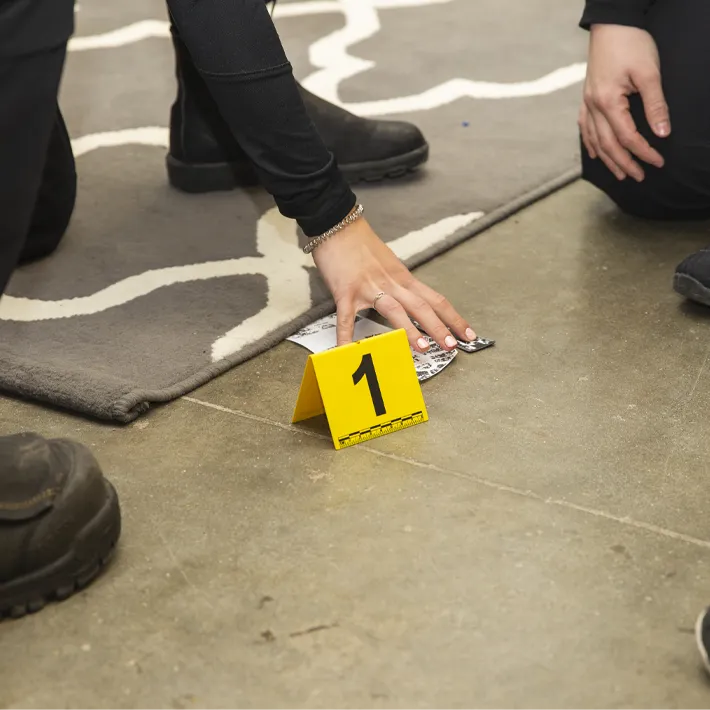
Our graduates find employment with military police, special constables - transit police, by-law enforcement, Canada Border Services, correctional services, police services, loss prevention and retail security, alcohol and gaming, industrial and corporate security, and private security or investigation.
Accreditations & Certifications
Ontario Ministry of Solicitor General
Upon graduation, students are eligible to write the Ontario Ministry of Solicitor General licensing examinations which are mandatory for private investigation and security guards in Ontario.
Graduates are eligible to apply for dual licenses as an investigator or security guard.
Incident Management Certification
Students will achieve certification in Incident Management Certification from Emergency Management Ontario.
Pathways
Transfer to Programs within Ontario
- Bachelor of Arts - Law & Justice
- Multiple Majors
- Honours Bachelor of Interdisciplinary Studies
- Honours Bachelor of Crime & Intelligence Analysis
- Combined Bachelor of Arts in Forensics & Criminology (Applied Forensics Science stream)
- Bachelor of Arts or Bachelor of Social Work
Want to see more Ontario transfers? Visit ONTransfer.ca.
Transfer to Programs outside of Ontario
- Bachelor of Professional Arts in Criminal Justice - enter into the third year of this program
- Bachelor of Science in Criminal Justice
- Bachelor of Business Administration
- Bachelor of Arts in Criminology
- Bachelor of Science in Police Studies
- Bachelor of Arts in Deviance, Crime & Culture
- Graduates of PFND will be credited with 85 transferable credits toward one of the programs listed - contact edupathways@lambtoncollege.ca to discuss the specifics of this agreement.
- Bachelor of Arts in Justice Studies
More Information
Career Considerations
All applicants should review the qualifications required to be eligible for a career in policing. These requirements are available at the Ontario Ministry of the Solicitor General website.
Skill Demands
Applicants should be aware that certain employment situations require a high level of overall physical fitness. However, the industry is so diverse that physical fitness may not be an issue. Some students with disabilities may require academic accommodations to equalize opportunities to meet the academic demands of a course or program.
Technology Requirements
It is recommended that students purchase a laptop with a Windows operating system.
Internet Speed Requirements
For best performance for students learning remotely, an internet connection with a minimum of 40 Mbps download and 10 Mbps upload speed is recommended in order to effectively use video conferencing and remote lecture delivery software as well as, other online resources remotely. Due to the large area over which students may be dispersed, we are unable to recommend a specific provider, so you will need to inquire around your area to find one that best suits your needs.
Minimum Laptop Requirements
In order to access the internet and virtually-delivered software and courseware, student laptops should include the following at a minimum. By meeting the following specifications, students will be equipped to access software and courseware on their laptop through the internet:
- Intel i5 8th Gen Processor or equivalent
- 16 GB of RAM (with a minimum of 8 GB)
- 100 GB HDD or more
- HD Graphics
- Webcam with a microphone
- Wireless 802.11n/ac 5ghz capable
- Windows Operating System (Windows 11)
Software
To ensure students are getting the most our of their classroom experience, some software will be required.
Lambton College has made this software easily accessible online. Students can leverage our Microsoft Office 365 software packages and services. In addition, much of the software you require for your courses will be available on demand for use on any device - on or off campus.


